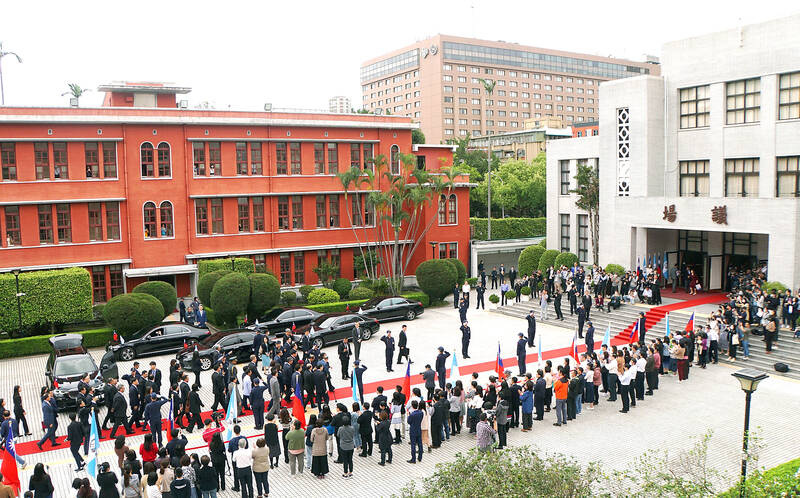The Legislative Yuan yesterday passed a preliminary review of a proposed amendment to the Organic Act of the Legislative Yuan (立法院組織法) which would establish an international affairs office.
If a third reading of the amendment can be completed during the current legislative session, which ends this month, the office could be established as soon as the next session, which is to begin in September, Legislative Yuan Secretary-General Lin Jih-jia (林志嘉) said yesterday.
International affairs are currently handled by the public relations division of the legislature’s Secretariat, which comprises only eight people, he said.

Photo: CNA
That has proved insufficient due to the increasing numbers of delegations visiting Taiwan, Lin said, adding that the legislature sometimes has to enlist the help of the Ministry of Foreign Affairs and business groups.
In the past four years, the legislature each year welcomed more than 250 delegations consisting of more than 3,000 members, which demonstrated the need to establish the office, Democratic Progressive Party Legislator Tang Hui-chen (湯蕙禎) said.
The division has welcomed 691 guests from 55 delegations during the current legislative session, the Secretariat said.
The new office is to have four civil servants in each of four sections, which are to be in charge of parliamentary exchanges, international cooperation, international communication and protocol-related affairs, Lin said.
After the establishment of the office, the public relations division could focus on domestic affairs, he said.
The primary duties of the office would include integrating parliamentary diplomacy tasks, actively fostering friendly relations with the parliaments of other nations, participating in international events and assisting in expanding Taiwan’s diplomatic space, he said.
The office would help deepen Taiwan’s relations with its diplomatic allies and enhance its substantial relationships with other nations, he added.
The personnel costs of the office are estimated to be about NT$33.24 million (US$1.08 million), the legislature’s Budget Center said.
The budget for work related to parliamentary diplomacy, which is to cover the operational costs of the office, is to remain unchanged at NT$22.6 million and can be increased if needed, Lin said.
The legislative caucuses of the DPP, the Chinese Nationalist Party (KMT), the Taiwan People’s Party and the New Power Party all proposed their own versions of the amendment, which are similar, he said.
Separately, regarding discussions of relocating the Legislative Yuan, which have been ongoing for more than 30 years, Lin said that Legislative Speaker You Si-kun (游錫?) is very serious about the plan and it is “not just talk.”
According to a report released in January, proposed new locations have been narrowed down to six — Chiang Kai-shek Memorial Hall Park, the former Air Force Command headquarters, the Taipei Detention Center in Tucheng (土城), the Chenggong Ling (成功嶺) military camp, Yilan County’s Chung Hsing Cultural and Creative Park and a zone near the high-speed rail station in Changhua County.

The Ministry of Foreign Affairs (MOFA) yesterday said it is closely monitoring developments in Venezuela, and would continue to cooperate with democratic allies and work together for regional and global security, stability, and prosperity. The remarks came after the US on Saturday launched a series of airstrikes in Venezuela and kidnapped Venezuelan President Nicolas Maduro, who was later flown to New York along with his wife. The pair face US charges related to drug trafficking and alleged cooperation with gangs designated as terrorist organizations. Maduro has denied the allegations. The ministry said that it is closely monitoring the political and economic situation

Conflict with Taiwan could leave China with “massive economic disruption, catastrophic military losses, significant social unrest, and devastating sanctions,” a US think tank said in a report released on Monday. The German Marshall Fund released a report titled If China Attacks Taiwan: The Consequences for China of “Minor Conflict” and “Major War” Scenarios. The report details the “massive” economic, military, social and international costs to China in the event of a minor conflict or major war with Taiwan, estimating that the Chinese People’s Liberation Army (PLA) could sustain losses of more than half of its active-duty ground forces, including 100,000 troops. Understanding Chinese

UNRELENTING: China attempted cyberattacks on Taiwan’s critical infrastructure 2.63 million times per day last year, up from 1.23 million in 2023, the NSB said China’s cyberarmy has long engaged in cyberattacks against Taiwan’s critical infrastructure, employing diverse and evolving tactics, the National Security Bureau (NSB) said yesterday, adding that cyberattacks on critical energy infrastructure last year increased 10-fold compared with the previous year. The NSB yesterday released a report titled Analysis on China’s Cyber Threats to Taiwan’s Critical Infrastructure in 2025, outlining the number of cyberattacks, major tactics and hacker groups. Taiwan’s national intelligence community identified a large number of cybersecurity incidents last year, the bureau said in a statement. China’s cyberarmy last year launched an average of 2.63 million intrusion attempts per day targeting Taiwan’s critical

‘SLICING METHOD’: In the event of a blockade, the China Coast Guard would intercept Taiwanese ships while its navy would seek to deter foreign intervention China’s military drills around Taiwan this week signaled potential strategies to cut the nation off from energy supplies and foreign military assistance, a US think tank report said. The Chinese People’s Liberation Army (PLA) conducted what it called “Justice Mission 2025” exercises from Monday to Tuesday in five maritime zones and airspace around Taiwan, calling them a warning to “Taiwanese independence” forces. In a report released on Wednesday, the Institute for the Study of War said the exercises effectively simulated blocking shipping routes to major port cities, including Kaohsiung, Keelung and Hualien. Taiwan would be highly vulnerable under such a blockade, because it